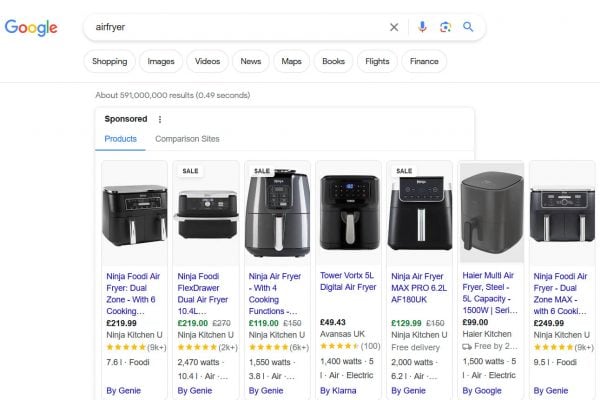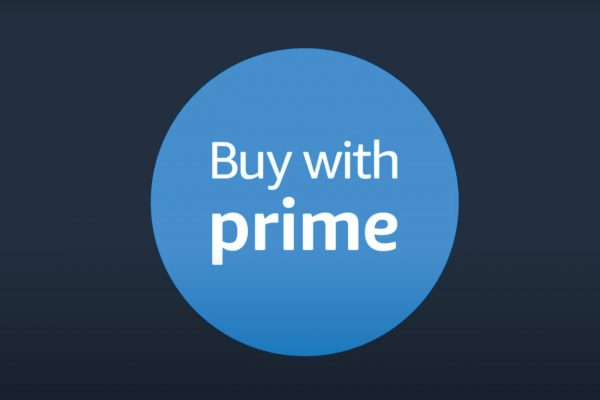The more I read about Google’s mega €2.4bn fine for promoting Google Shopping results over competitors the less sense it actually makes. There are several angles to consider
The scourge of Comparison Shopping Sites
Firstly, Google search results used to be littered with comparison shopping sites and this is a major aspect of the European Union Commission’s complaint. Frankly as a Google user it was a pain in the neck – if I searched for a product the last thing I wanted was to be sent to a comparison shopping site where there are more options for the same product.
Now I’m not saying there’s anything wrong with shopping sites and there are many of them such as eBay owned Shopping.com, Shopzilla, PriceGrabber, NextTag, Kelkoo and a relatively new site, Pricesearcher is also worth checking out if you’re after a shopping site. The thing is though, if I’m searching on Google I have by default decided that I want to find a product through Google’s search engine, not through one of their competitors otherwise surely I’d have started on the competitor’s site.
What lesser competitors real complaint is is that Google has been successful and their own comparison shopping service is entirely based on Google sending them free traffic. Let’s be serious, retailers pay for clicks in order for their products to be found on Google so why should a comparison site (who often times the retailer would still have to pay for clicks) expect to get placement for free?
It’s notable that the European Union Commission’s complaint is Google’s dominance makes it tough for new entrants to the market and yet Pricesearch has only recently launched and from everything we hear prospering quite nicely without relying on free traffic from Google.
What the European Union Commission wants
It’s not clear what change the European Union Commission actually want Google to make. On the face of things it would appear that they don’t want Google treating comparison shopping sites any differently to Google Product Listing Ads which retailers have specifically paid for to gain high visibility. The catch is that the comparison sites expect exposure for free.
The European Union Commission complain that comparison site results appear as low as page 4 on Google, but realistically where would your products appear in Google search results if you didn’t pay for exposure? If you are selling a brand then you’ll be competing with the brand itself and probably a load of high street retailers. If it’s your own brand then you’ll probably be near the top of search results.
Google lower comparison site product results, but not the sites themselves
If you search for any company on Google, they’re really good at surfacing that companies website. Google aren’t hiding or demoting shopping comparison sites if that’s what you search for. All Google are really saying is that if you search for a product you probably want to go directly to the site that you can buy the product from rather than another search engine.
Would you advertise competitors products on your website?
What the EU are effectively saying is that they want Google to display competitors products on Google. It’s bizarre, would you expect to walk down the high street and see a sign in Debenham’s window saying “Here’s a great Coffee Machine which you can buy cheaper at Argos”? If you think that’s ridiculous why would you expect Google to show other comparison shopping site results?
Are Google dominant?
The European Union Commission’s real complaint is simply that Google are too successful – they own around 90% of the search market in the UK. Bing, Yahoo!, Ask (formerly Ask ‘Jeeves’) and other search engines simply don’t appear to appeal to users.
However Google are far from the default shopping comparison site, otherwise how could the relatively new Pricesearcher.com be gaining traction. Certainly Google also argue that eBay and Amazon are product search engines but the European Union Commission refused to accept that they should be equated to Google.
I have news for the EU, today my mother rang me up and asked where should could get replacement bags for her Henry vacuum cleaner. I immediately fired up Amazon, placed an order and the bags will be delivered on Monday. It didn’t even occur to me to use Google or a shopping comparison site to start my search – I have Amazon Prime so a fast speedy and free shipping service fits the bill. If I hadn’t used Amazon I’d have gone straight to eBay but realistically eBay sellers wouldn’t be able to delivery by Monday.
(I did make a purchase on eBay this weekend, I went directly to the eBay app and made a purchase on this weekend for some coach bolts that I’m not in a hurry for… again I didn’t start my search with Google!)
Of course for some products I might search Google and doubtless many consumers do, but like me 19 million people in the UK subscribe to Amazon Prime and I’m willing to bet they start their searches on Amazon too.
What will Google do?
Google will of course appeal and have 90 day to do so (although the EU could rack up daily fines in the mean time). Long term there are two courses of action that they could take.
Google could take the laughable decision to open their API and display rival comparison shopping site results on an equal footing with their own search results. That would mean retailers could stop paying for Google Product Listing Ads and go to the cheapest comparison shopping site knowing Google are forced to display their search results for free.
The more likely option is that Google will simply remove paid adverts from search results and sign post users to Google Shopping.
Suppose Google removes paid ads from search results?
Regardless of whether you are considering natural search or paid search results, when you search Google with the intention of buying a product what you really want is a link directly to the product and it’s great if you can see different buying options with prices displayed alongside. What you don’t want is to be sent to some random comparison site.
If Google simply removes paid ads and simply surfaces natural search results, the probability is high that their algorithm will still determine that the consumer would prefer a direct link to a product rather than go and search another website and comparison shopping sites will still be relegated to page 4 of search results.









8 Responses
Great article! I agree, Google have done nothing wrong. It is their website, they can do what they want.
google has positioned itself as the de-facto search engine. it’s now a verb. you dont search for something on the internet, you google it.
with such dominance comes additional responsibilities, which google are aware of, and have shirked.
you can’t abuse a near-monopoly to pedal your other goods, you just cant, it’s the law, whether you like it or not.
if that were allowed, then the law, to protect the general public, would be to dismantle any such monopoly post haste, or prevent it occuring.
microsoft were fined by the EU for bundling software with windows operating system. why? they have a (near) monopoly on the OS, they cannot abuse that to create a monopoly on other pieces of software the OS runs. the google situation is much the same.
Er Ebay could not deliver by Monday!! A seller on Ebay most likely can, especially if you are prepared to pay for it. After all you do pay for it on Amazon via prime. Coach bolts, hex round hex bolts, washers etc are (dependent on size) standard off the shelf items for many so should not have been a problem.
Real point seems Google are dammed if they do and dammed if they don’t, I used to be in the flight business and comparison sites that did not actually broker the flight used to irritate me something chronic and the like are not really welcome by me when searching for a product.
Classic EU if you ask me 🙂
Some interesting points, but please proof-read it before publishing! Spelling mistakes, missing apostrophes etc mean that you have to read some of it twice to get the sense.
When was ‘often times’ English? ‘Often’ is fine.
Just like people saying ‘price point’ when they mean ‘price’..
Isn’t the issue here monopoly and how you police this.
For example Tesco couldn’t by Sainsbury’s, it wouldn’t be allowed under competition rules.
The issue is there is nothing like this to police the internet, so Google, Amazon etc and can do whatever they like and have 100% market share and control prices.
This is perhaps not the correct way but someone and some point has to police this.
For example is it fair that Amazon don’t show the cheapest priced product in the buy box, surely this is unfair to consumers? That’s just the tip of the iceberg.